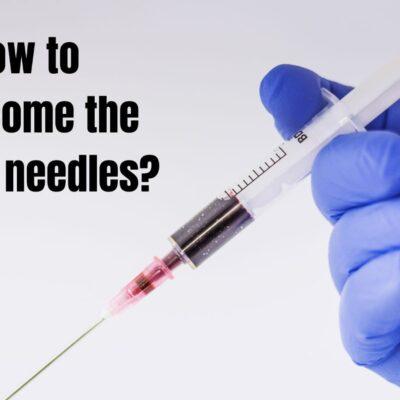How to overcome the fear of needles: Fear is a fascinating emotion. It can overtake our mind and body in response to anything we might sense as a threat. It keeps us safe by activating a strong reaction to dangerous situations like physical attacks or needle pain.
However, it also forces us to react likewise to non-dangerous situations like upcoming office presentations or public speaking. Fear is meant to keep us safe, but, sometimes, it can have a different effect. This is especially true when it comes to life-saving medical situations like injections/needles. And the fear of needles is more common than you think.
Common reactions to needles
We all react differently to fear, but recognizing the common reactions can help you design and adjust when the time comes. Here are a few human reactions to needles:
- Panic attacks
- Anxiety
- Increase blood pressure
- Dizziness
- Insomnia
- Racing heart rate
- Avoiding medical care
Now that we understand the common reactions to needles, let us read about how to overcome your fear of needles.
How to overcome the fear of needles:
Schedule needle injections appointment at home
Unfamiliar surroundings can boost your anxiety and make you feel uneasy. Especially if you have to wait for the injection in a public place like a waiting room. This is why many patients choose the privacy and comfort of their homes rather than a doctor’s office or lab.
Organize a coping technique
Feeling more in control of a situation can relieve stress and anxiety. Trying various techniques and coping strategies in advance of an injection can help you better control how you react. This includes relaxation techniques like deep breathing, concentrating on surrounding objects, or hearing to relaxing music.
Also Read: How to improve mental health?
Communicate
It is always necessary to communicate your experiences and fears around needles to the healthcare professional serving the injection. The fear of the needle is ordinary enough that they can help adjust and support you.
Look away
Watching all the practice that goes into the injection or the needle itself will only worsen your anxiety, so it is most suitable to look away when the time comes.
Lie down
If you know you are sensitive to fainting or getting dizzy around needles, choose to lie down before acquiring the needle stick.
Take medication if needed
Specific medications can help take the edge off if you are tense about needles. However, make sure to talk to your doctor beforehand to ensure the medication would not interrupt any test results or the injection.
Distract yourself
There are a bunch of ways to divert yourself while getting a shot. Watch television, use your phone, listen to music, or simply stare out of the window, whatever you need to do to take your mind off the shot is a valuable tool to overcome your fear of needles.
At the end
Fear is a genuine emotion, but it should not stop you from receiving life-saving medical care like vaccines, routine health appointments, and lab work. Using the above-mentioned tips should help you navigate some of your anxiety and make the process easier.



